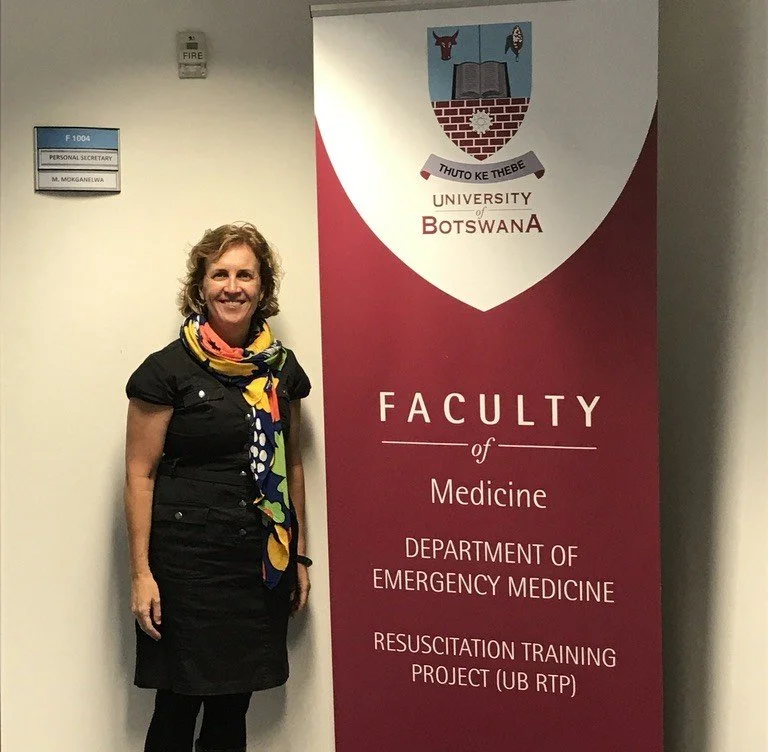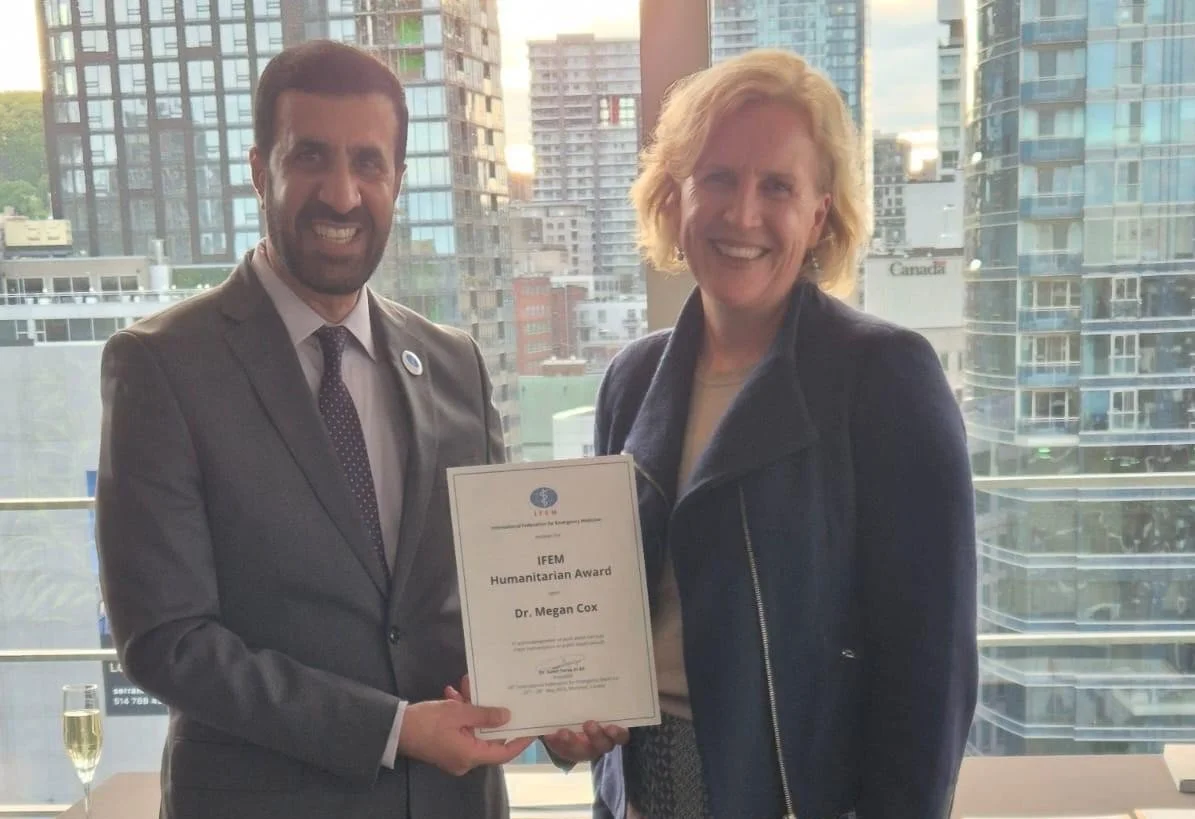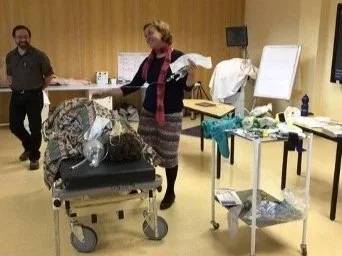Making a world of difference
After a career spent working in resource-limited emergency medicine settings around the globe, FACEM Associate Professor Megan Cox received the International Federation for Emergency Medicine (IFEM) Humanitarian Award 2025 at the International Conference on Emergency Medicine (ICEM) this May in Montreal. This award recognises an individual or organisation that has conducted work related to international emergency medicine which has led to major humanitarian or public health benefits or positive effects.
FACEM Associate Professor Megan Cox - 2025 IFEM Humanitarian of the Year - has spent decades working across a wide range of resource-limited clinical settings and health systems, including emergency departments (EDs) in the Pacific, Tanzania and Botswana.
Yet when she first arrived in Botswana as Acting Head of the Department of Emergency Medicine, University of Botswana, as well as Emergency Specialist, Princess Marina Hospital, Gaborone, she encountered an unfamiliar system with minimal emergency care frontline support.
‘The country’s medical school had only just started, so every single doctor in the country had been trained outside of Botswana,’ Megan said.
‘There was a common nursing culture because nurses were trained in Botswana, but I'd be supervising a patient and I’d have a Cuban-trained neurosurgeon, a Chinese-trained neurologist and a German-trained anaesthetist. There was no common agreed pathway of how to manage patients, so there was a huge amount of variability and often massive communication problems.’
Ongoing commitment
Megan has a deep and ongoing commitment to global emergency care (GEC). Her career has encompassed humanitarian response, emergency care capacity building, emergency medicine (EM) specialty development, global health research and GEC advocacy.
Currently a Senior Emergency Medicine Specialist and State Retrieval Consultant for New South Wales Health, Megan’s more than 30 years of practice across Australia, the Pacific and Africa made her an ideal candidate for the IFEM Humanitarian of the Year Award.
“I’d be supervising a patient and I’d have a Cuban-trained neurosurgeon, a Chinese-trained neurologist and a German-trained anaesthetist. ”
She is the fourth FACEM to receive the award in recent years, following in the footsteps of Dr Georgina Phillips (2023), Professor Gerard O'Reilly (2022) and Dr Rosanne Skalicky (2021). At this year’s ceremony, FACEM Associate Professor Anthony Joseph was also awarded the Order of the IFEM.
Megan she said she was thrilled to win the IFEM award at the ceremony in Canada this year and felt fortunate to have had opportunities, to not only provide care in resource-limited settings, but also to contribute to clinical and capacity-building projects where they were needed most.
She said the peer recognition of her work from the wider medical fraternity via IFEM was what meant most to her. ‘It was amazing. It was a real privilege. I feel like I need to spur other people on to do the same thing.’
Megan completed her undergraduate medical training at the University of Newcastle in 1992. Her first GEC experience came soon afterwards in the Solomon Islands, where she experienced and developed basic skills in the delivery of resource-limited acute care.
‘[For me] it was a very pivotal moment working there,’ she said. ‘I was in charge of the paediatric section and the general ward. Doing ward rounds and seeing people, and then watching them get discharged, and then meeting them on the island was really amazing.’
The value of teamwork
Megan then volunteered for a humanitarian mission with Médecins Sans Frontières in Sudan after finishing her ACEM training, where she really learned the value of multidisciplinary teamwork.
‘There was just a small group of us - a midwife, myself, a logistician and an engineer. We had another nurse who came in for the feeding unit. If I got sick, the place kind of just ran itself,’ Megan said.
‘But if the engineer got sick, everything just ground to a halt. He was doing all the solar panels and the water and the payments and the logistics. You realise very quickly who has the influence in that kind of environment.
“If the engineer got sick, everything just ground to a halt... You realise very quickly who has the influence in that kind of environment. ”
‘It was incredibly remote, poorly resourced, intense, and you were very humbled about what your role is in the health system. If there's no running water and there's no peace treaty and there's no education system, you just do what you can do.’
Upon her return to Australia, Megan completed a Master of International Public Health Then she undertook a series of clinical and capacity-building roles in Africa, including in Uganda, Tanzania and Kenya. She said her work in these settings took some adjustment.
‘The problem was that acute medicine wasn't really understood at that time,,’ Megan said. ‘There were increasing issues with trauma - such as car and road trauma, interpersonal violence, [construction] work. The traditional [medical system], based on maternal child health, infectious diseases and general medicine, was struggling to cope.’
Long-term difference
Megan realised that she would have to make a more full-time permanent commitment to her GEC work if she wanted to make a long-term difference to resource-limited health systems. She ended up living and working in Botswana for six years, playing a critical role in developing a local EM specialty training programme, as well as leading emergency care-strengthening activities in the country’s capital Gaborone. She said she learned a lot about herself and her strengths during this time.
‘I learned a lot from living in Botswana. a landlocked country. You have to negotiate borders [to transfer patients and various medical equipment], alongside many other challenges.’
Megan said it all came together for her when the local medical students and the first emergency registrars started graduating and working alongside her in the Botswana health system.
“The medical students and registrars [were] great because they were all from Botswana. They all could speak the local language, plus English. They were all very smart, really motivated, very inspiring,’ Assoc Prof Cox said.
‘[When they graduated] it was just incredible. I was just smiling the whole time and having my photo taken, feeling so grateful and proud of them.’
It was only when she decided to finally return to Australia that she realised what she was leaving behind.
‘After the first two years, everyone was like, “You're still here?”,’ Megan said. ‘And then at the end of six years, when I said I was leaving, everyone was like, “But you can't leave now. This is your home.”’
Since returning to Australia, Megan has been Chair of ACEM’s Global Emergency Care Committee and assisted organisation of the 2024 African Conference on Emergency Medicine in Gaborone as Chair of the Scientific Committee.
She has also published a large number of papers relevant to emergency care education and practice in resource-limited settings. Of particular note, she is a recent co-author on several influential papers published in the Lancet Western Pacific relating to emergency care quality improvement in the Pacific with a group of researchers from GEC..
‘The conference [in Botswana] was amazing because I met lots of people who I worked with, who are now running the ambulance system, they're teaching the paramedics, they're running the emergency departments,’ Megan said. ‘And so you just think, “Wow, this is, this is great.” You've been part of this really transformational system.’
“After the first two years, everyone was like, “You’re still here?” And then at the end of six years, when I said I was leaving, everyone was like, “But you can’t leave now. This is your home.”’ ”
Megan recommended that FACEMs think about getting involved in the GEC program, especially if they are contemplating contributing to developing medical systems in resource-limited settings. Her best piece of advice? Do your homework – find help both before you leave and when you arrive.
‘Reach out and research, don't do it alone. It's never going to go to plan, so find collaborators, find mentors on either side,’ she said.
‘There's actually a wealth of knowledge in the College, a lot of people who've done extraordinary things globally. I think that there's a lot of power in working together.
‘I certainly wouldn't have got this far without being part of a wider global emergency family.’









